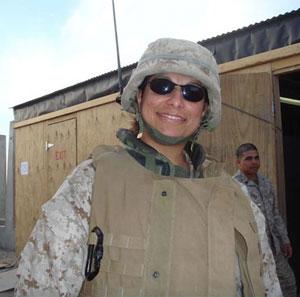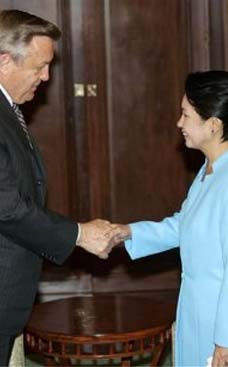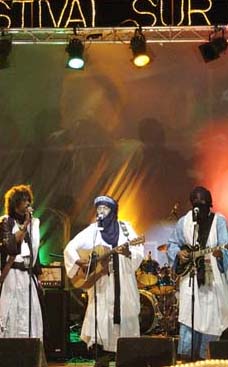
Angela Williams went on to the University of Denver - the same institution from which Secretary of State Condoleezza Rice received her undergraduate degree - before dropping out of graduate school in 1978 to join the Peace Corps. "The bug just got to me," Williams said. "I was so anxious to go out in the world and do something." After volunteering in the West African nation of Niger, Williams joined the World Council of Churches relief agency in Senegal. A Muslim housemaid there helped Williams convert to Islam in 1981, the culmination of a longtime spiritual quest. Switching faiths proved just as controversial for Williams as for Ansam's family. She lost her job with the Christian relief group and faced a strained relationship with her parents, who were devout followers of the Church of God and Christ. "My father hung up the phone," Williams said. "I called back again and my mother answered this time. She said, `I still love you,' then she hung up too." Williams remained in Senegal, where she studied Islam and married a local Muslim activist. He died of a heart attack when she was five months pregnant; she miscarried three months later. That experience, Williams said, helps her empathize with the grief of the Iraqi women she reaches out to in Anbar. "I was a 24-year-old widow, so I understand how it is out here to be a young widow," Williams said. "I would walk the streets in Washington, D.C., and ask myself, `Why am I alive?'" Struggling to recover from the tragedy, Williams dabbled in agricultural studies, then worked briefly at the World Bank. She found her calling in 1989 when she joined the U.S. Foreign Service, which offered her the opportunity to create cultural affairs programs in far-flung posts across the globe.
Niger RPCV Angela "Khadija" Williams,a veteran U.S. foreign-service officer who embraced Islam nearly three decades ago, is helping gain asylum for Ansam, an Iraqi translator for coalition forces
Iraqi Christian, American Muslim find sisterhood
By Hannah Allam
McClatchy Newspapers
Caption: Ansam, an Iraqi translator for coalition forces whose last name is withheld because of death threats against her, at Camp Fallujah. Ansam hasn't been able to gain asylum in the United States, despite letters of recommendation from a Marine brigadier general, several colonels and a number of other officers who praised her service as a translator and guide. Photo: Hannah Allam/MCT
BAGHDAD, Iraq - For nearly four years, a young Iraqi woman has lived among U.S. Marines in perhaps the most dangerous, miserable outpost of the war.
She takes all her meals in their chow hall. Every stitch of her clothing is military-issue or purchased in the base commissary. She risks her life alongside the Marines in perilous operations, prays with them at chapel each Sunday and mourns their losses like family.
But she hasn't been able to gain asylum in the United States, despite letters of recommendation from a Marine brigadier general, several colonels and a number of other officers who praised her service as a translator and guide.
On the same base, an American civilian also lives among the Marines. A convert to Islam from the gritty south side of Chicago, she's outraged by the translator's predicament and is on a mission to get the Iraqi woman resettled in the United States.
From the moment the two met at a women's outreach program in November, the uniformed Iraqi Christian and the veiled American Muslim have nurtured a sisterhood that sustains them in the testosterone-charged war that the Iraqi is trying to escape and the American is trying to win.
Ansam, 34, whose last name has been withheld because of death threats against her, has witnessed at least six troop rotations at Camp Fallujah, the Marine base in Anbar province, where insurgents affiliated with the group al-Qaida in Iraq have fought U.S. troops largely to a standstill.
Each of the American units she's worked with has promised to help her flee Iraq. Every time, those efforts have failed because of bureaucratic tangles, a lack of follow-through, and, knowledgeable officials said, the U.S. government's unwillingness to resettle Iraqis in the United States. Accepting refugees would mean acknowledging that Iraq has been in chaos since the U.S.-led invasion four years ago.
"When they leave, I feel depressed. They tell me, `Stay strong, be safe and we'll see you in the States,'" Ansam said in an interview at the Baghdad compound of her employer, the California-based Titan Group. "But every time I get hope, just a little hope, something happens and it's gone."
Angela "Khadija" Williams, 53, is a veteran U.S. foreign-service officer who embraced Islam nearly three decades ago and now serves as a U.S. cultural affairs liaison at Camp Fallujah. A State Department colleague familiar with Williams' devotion to the translator's case affectionately described her as "a pit bull in hijab."
"Six groups have left her behind. I said, `Not on my watch,'" Williams fumed during a walk through Saddam Hussein's former Republican Palace, now the anchor of the secure Green Zone compound in Baghdad.
"Whatever it takes," Williams vowed, "I'm getting her out."
Ansam is one of hundreds if not thousands of Iraqis who've put their lives on the line for U.S. forces only to be denied or blocked from immigrating to the United States. Last year, the United States resettled just 202 Iraqi refugees. The State Department has announced plans to expand its resettlement program to some 7,000 refugees annually, with priority going to Iraqis who've worked with the U.S. government.
Documents from Ansam's asylum file and interviews with her advocates and her in Baghdad portray a woman left to fend for herself in the new Iraq.
Her father died of a heart attack in 1993. Her mother and four younger sisters were killed in a mortar barrage the first week of the war. Her tribe - the Dulaimys, Anbar's most powerful clan - has disavowed her because her family converted to Christianity and she works with Americans.
Ansam's photo and full name are posted throughout Fallujah's mosques, marking her for death. Insurgents regularly call or text-message her with threats and vile accusations. Unlike the base's other Arabic-language interpreters, Ansam can't risk leaving "the wire" for breaks. She works 12-hour shifts seven days a week and spends her nights watching sitcoms or reading Nora Roberts novels.
"She really has no other place to go. She could go to Europe, but she's really been with Americans for the past four years," Williams said. "She watches our television, she reads our papers, she interprets our words on freedom and democracy, even though this freedom and democracy will never be for her. She has too many strikes against her in Iraq."
Ansam was denied a student visa, and she didn't make the cut for a military program that would have allowed her into the United States for 90 days. She was approved for another program to resettle at-risk interpreters, only to be told that the 50 slots already were filled. She's turned down sympathetic Marines who offered to marry her for the coveted U.S. "fiancee visa."
"I want to do it in a right way," Ansam said with a shrug.
Now, Williams is focused on Plan B: Renew Ansam's Iraqi passport, stick her on a U.S. military plane to Jordan and persuade the gatekeepers in Amman and Washington to put her on a fast track for asylum.
With virtually no expenses for the past four years, Ansam has managed to sock away a tidy sum. A female Marine captain who worked with Ansam in Fallujah wants the translator to live with her in Arizona until she finds her feet.
But the clock is ticking. Ansam's latest unit rotates out of Anbar this week and she still doesn't have her passport, even after paying more than $1,000 in bribes to Iraqi middlemen and taking risky taxi rides alone to Iraqi government offices outside the Green Zone.
"It'll happen," Williams reassured a sobbing Ansam after yet another day with no progress. "Insha Allah," God willing.
Ansam's father was an English professor who hailed from the close-knit Dulaimy tribe with roots in Ramadi, the capital of the predominantly Sunni Muslim Anbar province. Her mother came from a large Christian enclave in Habbaniyah, outside Fallujah.
Ansam's grandfather was so angry that his son had married a Christian that he disinherited him in court and cast him from the tribe. Her father then converted to Christianity, and Ansam and her sisters were reared as Christians in Baghdad, though they respected tribal customs and never lost their distinctive Anbar accents.
When Ansam was 18, she was forced into marriage with a man 20 years her senior, which lasted a decade, largely because he supported her mother and sisters after her father died in 1993.
She was living with her mother and sisters in the Baghdad neighborhood of Adhemiya when U.S. forces invaded. With gun battles raging, Ansam's mother and sisters set out to find food and water. A mortar shell landed on their car, killing them all.
Ansam fell behind on the rent and was evicted. With just a handful of dinars, she hired a taxi and cruised around Baghdad looking for work.
She spotted a job posting for an English speaker outside a Baghdad hotel that U.S. troops had taken over. She was hired on the spot, earning $5 a day as well as lodging.
"I had a place to stay, a job; I couldn't believe it," Ansam recalled. "I was going out with them to read the signs, to help with shortcuts and to draw maps because I knew Baghdad very well."
The American troops helped Ansam secure a translating job with Titan, one of the largest federal contractors for the war. In February 2004, she was dispatched to join the Marines at Camp Fallujah.
"I feel proud about my work," Ansam said. "All my colonels, they treat me with respect. When I say I don't have family, they get mad. They say, `We are your family.'"
But outside Camp Fallujah, translators are collaborators, and Ansam was in danger. Seven months after she arrived on base, she left to visit a friend. Days later, the woman's body was discovered with a single gunshot wound to the head and a note that promised a similar fate for others who associate with "Jews, spies and traitors."
"One time I was translating on a mission and an Iraqi came up to me and said, `Shame on you. Your tribe is fighting and you're helping the enemy,'" Ansam said quietly. "They know who I am."
The war grew deadlier, too. Twice, Ansam survived suicide bombings at a checkpoint outside the civil affairs center where she was stationed. A sniper killed two of her close friends, including a 19-year-old Marine.
In June 2005, Ansam and several female Marines excitedly prepared to leave their garrison and head back to Camp Fallujah for a weekend break with hot showers and comfort food. The Marines climbed into a 7-ton military truck, but there was no room for Ansam, so she rode in a Humvee. Along the way, a suicide car bomber rammed the truck, killing three of the women and injuring 11.
"They all got burned," Ansam recalled, tears welling in her eyes. "I was watching them jumping from the truck and screaming. I was stuck in the Humvee and couldn't do anything. They were so young, so beautiful."
In the military bubble of Camp Fallujah, there's little room for feminine niceties. Ansam can't recall the last time she wore a dress. She walks with a soldier's swagger and sports tracksuits emblazoned with "Operation Iraqi Freedom."
Her two concessions are a gold charm necklace she received as a birthday present from her unit and a bottle of perfume she bought at a shop on base.
"It's called Lovely," Ansam said, her eyes lighting up. "Do you know it? It's by Sarah Jessica Parker."
Williams began life as a preacher's daughter from a conservative family on the historically black south side of Chicago; she jokes that the only white people she saw were on television.
She was in church six nights a week and credits her father, who was an acquaintance of the Rev. Martin Luther King Jr. and other civil rights figures, with instilling a sense of civic duty.
The fledgling activist graduated from high school as valedictorian and ventured out of her "all-black ghetto" to study at Colorado Women's College. It was the early 1970s, and the nation was in the throes of the Vietnam War, the civil rights movement and a push to end apartheid in South Africa.
Williams then went on to the University of Denver - the same institution from which Secretary of State Condoleezza Rice received her undergraduate degree - before dropping out of graduate school in 1978 to join the Peace Corps.
"The bug just got to me," Williams said. "I was so anxious to go out in the world and do something."
After volunteering in the West African nation of Niger, Williams joined the World Council of Churches relief agency in Senegal. A Muslim housemaid there helped Williams convert to Islam in 1981, the culmination of a longtime spiritual quest.
Switching faiths proved just as controversial for Williams as for Ansam's family. She lost her job with the Christian relief group and faced a strained relationship with her parents, who were devout followers of the Church of God and Christ.
"My father hung up the phone," Williams said. "I called back again and my mother answered this time. She said, `I still love you,' then she hung up too."
Williams remained in Senegal, where she studied Islam and married a local Muslim activist. He died of a heart attack when she was five months pregnant; she miscarried three months later. That experience, Williams said, helps her empathize with the grief of the Iraqi women she reaches out to in Anbar.
"I was a 24-year-old widow, so I understand how it is out here to be a young widow," Williams said. "I would walk the streets in Washington, D.C., and ask myself, `Why am I alive?'"
Struggling to recover from the tragedy, Williams dabbled in agricultural studies, then worked briefly at the World Bank. She found her calling in 1989 when she joined the U.S. Foreign Service, which offered her the opportunity to create cultural affairs programs in far-flung posts across the globe.
Williams served in Ghana, France, India, Egypt and Saudi Arabia. After her father died, she persuaded her mother to travel with her to several of the postings. Her mother died of breast cancer in 1997.
"She died saying, `Thank you for taking me with you,'" Williams said.
In Iraq, Williams easily passes for a local, with her smooth brown face framed by a veil, until onlookers catch a glimpse of the white sneakers peeking out from underneath her black cloak.
"When I first got to Anbar, people thought I was lost," she said with a laugh. "They thought I was a villager who somehow wandered on base."
Ansam and Williams first crossed paths when they worked on an empowerment program for Iraqi women in Anbar. They clicked instantly, marveling at the parallels in their lives: grief for their parents, tests of their faith, life as civilian women among battle-hardened Marines and a determination to improve the lives of ordinary Iraqis.
Ansam and Williams spent the past week in Baghdad, where Williams lobbied U.S. refugee officials, compiled Ansam's recommendation letters, surfed the Internet for federal resettlement options and sent flurries of e-mails to military and civilian friends with influence in Washington.
When Iraqi officials stalled on Ansam's passport, Williams picked up the phone and warned them in Arabic to issue the document or face her wrath.
"I believe God has his angels and Angela is one of them. If I get out of this, I owe her my life," Ansam said. "The others tried; I know they did. They wrote nice letters, but it always ended with a problem with the law."
The friends cut a striking pair as they strolled together through the ornate marble halls of the Republican Palace one recent day. Ansam was in full camouflage and toted a Burger King sack. Williams was in her trademark black and yelled, "Assalamu alaikum!" - the Islamic greeting of "Peace be upon you" - to Iraqi colleagues.
They walked to lunch, oblivious to the double takes of the soldiers and security contractors who roam the palace. Williams put her arm protectively around Ansam, looked her square in the eye and said: "No one's forgetting you."



















